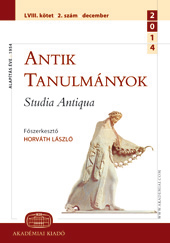Bizánc bukásának „relatív” történelemfilozófiai értelmezése Megjegyzések az imbrosi Kritobulos történelemszemléletéhez
The "relative" philosophical interpretation of the Byzantine Fall Notes on the history of Imbros Kritobulos's history
Author(s): Iván TóthSubject(s): Social Philosophy, Military history, Social history, 15th Century
Published by: Akadémiai Kiadó
Keywords: fall of Constantinople; philosophy of history; τύχη; Herodotus; translatio imperii;
Summary/Abstract: The capture of Constantinople by the Turks was the last act of the history of a languidly dying empire. The majority of the contemporary Byzantines explained the Turkish conquest with the divine providence. There were, however, a few intellectuals who broke with the Christian interpretation and looked for a different explanation. One of the historians of the Halōsis, Kritoboulos of Imbros belonged to them. This paper analyses his idea of history. In contrast with the earlier conception according to which in Kritoboulos’ work history is governed by the unpredictable τύχη, we suggest that the Hellenistic concept was not the only one – and the most important – among the ideas which he used for the interpretation of the past.
Journal: Antik Tanulmányok
- Issue Year: 61/2017
- Issue No: 2
- Page Range: 225-246
- Page Count: 22
- Language: Hungarian
- Content File-PDF

